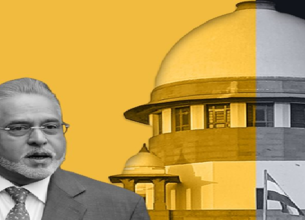FUGITIVE ECONOMIC OFFENDERS AND THEIR EXTRADITION
15, May 2020

Prelims level : Policies
Mains level : GS-II Bilateral, regional and global groupings and agreements involving India and/or affecting India’s Interests.
Why in News?
- The UK High Court rejected a plea of Fugitive Economic Offender Vijay Mallya to move the Supreme Court against the dismissal of his appeal challenging the lower court’s approval of his Extradition to India in the IDBI Bank fraud case.
Who is a Fugitive Economic Offender?
- A person can be named an offender under this law if there is an arrest warrant against him or her for committing any offence listed in the schedule of the act and for involvement in economic offences involving at least Rs. 100 crore or more and has fled from India to escape Legal Action.
- Major criteria that have to be satisfied are:
1. The Person has left the country to avoid facing prosecution.
2. He refuses to return to India to face prosecution.
About Fugitive Economic Offenders Act, 2018:
- The Fugitive Economic Offenders Act, 2018 seeks to confiscate properties of economic offenders who have left the country to avoid facing criminal prosecution.
- Offences involving amounts of Rs. 100 crore or more fall under the purview of this law.
- Some of the offences listed in the schedule of the bill are-counterfeiting government stamps or currency, cheque dishonour for insufficiency of funds, money laundering, transactions defrauding creditors etc.
What are its Proceedings as per the Act?
- To declare a person an FEO, an application will be filed in a Special Court (designated under the Prevention of Money-Laundering Act, 2002) containing details of the properties to be confiscated, and any information about the person’s whereabouts.
- The Special Court will require the person to appear at a specified place at least six weeks from issue of notice. Proceedings will be terminated if the person appears.
- Attachment of the property of a fugitive economic offender.
- Confiscation of the property of an individual declared as a fugitive economic offender resulting from the proceeds of crime. Confiscation of other property belonging to such offender in India and abroad including benami property.
- Disentitlement of the fugitive economic offender from defending any civil claim.
- All cases under the proposed law will be tried under the Prevention of Money Laundering (PMLA) Act and the administrator will sell the fugitive’s properties to pay off the lenders.
- The proposed law will have an overriding effect over all other pieces of legislation.
What is Extradition?
- It is the formal process of one state surrendering an individual to another state for prosecution or punishment for crimes committed in the requesting country’s jurisdiction.
- This is generally enabled through a bilateral or multilateral treaty.
- The legal basis for extradition with countries with which India does not have an Extradition treaty is provided by Section 3 (4) of the Indian Extradition Act, 1962.
About Indian Extradition Act, 1962:
- In India, the extradition of a fugitive criminal is governed under the Indian Extradition Act, 1962. This is for both extraditing of persons to India and from India to foreign countries. The basis of the extradition could be a treaty between India and another country. India has extradition treaties with 39 countries currently.
- Example, underworld don Abu Salem was extradited from Portugal to India to face charges. He, along with his wife, was extradited on the conditions that they would not be given the death penalty in India. This was so because European law prevents extradition to a country where capital punishment is in practice.
What is the Extradition Procedure in India?
- Information about the fugitive criminals wanted in foreign countries is received from the country or through Interpol.
- The Interpol wing of the CBI then passes the information to the Concerned police departments.
- The information is also passed on to the Immigration Authorities.
- Then, action can be taken under the 1962 Act.
Way Forward:
- Extradition is as much a Political Process as it is a Judicial one.
- The expeditious processing of extradition requests and the commitment to prepare for and defend the case before Courts depends on bilateral relations and the opportune use of diplomacy and negotiations to push for the process by the requested country.
- India needs to take steps to dispel concerns regarding poor Prison Conditions and potential human rights violations of the requested Person.
- India could consider signing international instruments, such as the UN Convention against Torture (1984) to establish India’s zero tolerance towards torture and custodial violence.
- For addressing investigational delays, it is imperative to improve the capacity and organizational efficiencies of law enforcement agencies so that they may conduct speedy investigation in these cases.
- To ensure that India’s extradition requests are in compliance with treaty conditions and documentary requirements, India must put in Place Suitable Organizational Mechanisms to familiarize itself with laws and regulations of Treaty states.
- India could adopt the good practices of the US’ Office of International Affairs (OIA), Washington’s primary body to handle extradition requests, and employ lawyers and station Trained Liaison officers in countries with which the country has extradition Relations.







